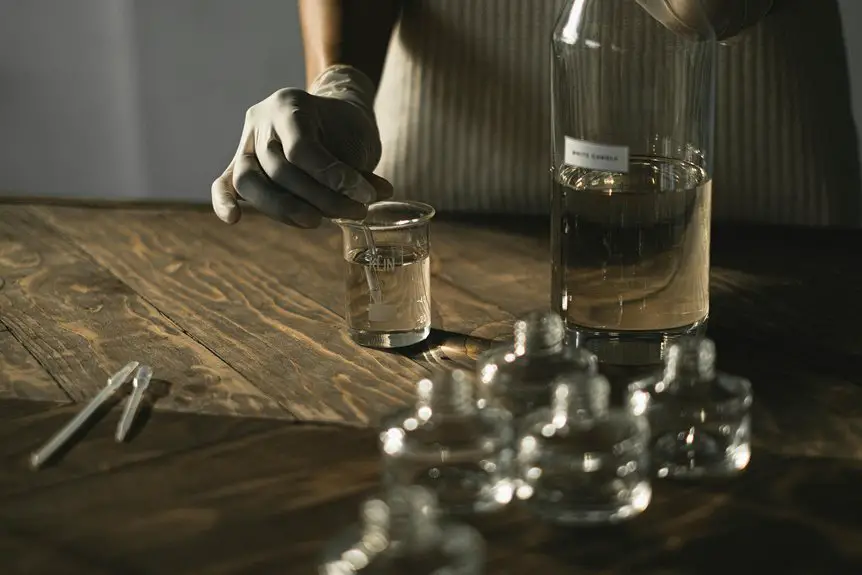Your clothes smell fine when wet because moisture helps release pleasant scents. However, as they dry, trapped odors from bacteria, mildew, and detergent residues can emerge, creating a stinky smell. Incomplete drying allows these odors to develop, especially in humid conditions or with poor airflow. Different fabric types also influence how odors are retained. Learning about these factors can help you keep your laundry fresher for longer, and there are more tips ahead!
Table of Contents
Key Takeaways
- Damp clothes emit pleasant scents due to moisture releasing fragrance compounds, masking underlying odors.
- As clothes dry, moisture evaporates, concentrating trapped smells like sweat and detergent residues.
- Inadequate drying creates an environment for bacteria and mildew, which release odorous compounds.
- Detergent residue may remain on fabric if not rinsed thoroughly, trapping odors when dry.
- Different fabric types retain odors differently; ensuring proper washing and drying techniques is crucial.
The Role of Moisture in Odor Perception
When you pull your clothes out of the wash, they smell fresh and clean, thanks to the moisture they hold. This dampness can temporarily mask any unpleasant odors, creating a pleasing fragrance. The water molecules interact with the fabric, helping to release scent compounds that smell delightful.
However, as your clothes dry, the moisture evaporates, leaving behind concentrated odors that were previously hidden. Without that moisture, those once-damp fibers can trap smells, making them more noticeable. You might find that sweat, detergent residues, or environmental odors become more pronounced as the garments dry.
Consequently, moisture plays a critical role in how you perceive odors, transforming your laundry experience from fresh to funky as it dries.
Bacteria and Mildew: The Hidden Culprits
Moisture not only enhances the fresh scent of your laundry but also creates a breeding ground for bacteria and mildew.
When your clothes stay damp for too long, these microorganisms thrive, leading to unpleasant odors that linger after drying. You mightn’t notice the smell when the fabric is wet, but as the moisture evaporates, the bacteria release odorous compounds that cling to your clothes.
Even if you wash them thoroughly, inadequate drying can leave behind enough moisture to foster this growth.
To combat this, guarantee your laundry dries completely and promptly. You can also consider washing your clothes in hot water occasionally to eliminate any lurking bacteria.
Detergent Residue and Its Effects
Though you mightn’t realize it, detergent residue can considerably impact your clothes’ scent after washing. When you don’t rinse your clothes thoroughly, leftover soap can cling to the fabric.
This residue traps odors and creates a breeding ground for bacteria, leading to that unpleasant smell when your clothes dry. You may notice your laundry smells fresh when wet, but as it dries, the detergent residue can become a source of stench.
To avoid this, make sure you’re using the right amount of detergent for your load size and water type. Also, consider running an extra rinse cycle to help eliminate any lingering residue.
The Impact of Fabric Type on Smell
While you might not think about it, the type of fabric your clothes are made from plays a significant role in how they smell after washing. Different fabrics have unique properties that can trap odors.
| Fabric Type | Odor Retention | Tips for Freshness |
|---|---|---|
| Cotton | Low | Wash regularly; use vinegar |
| Polyester | Medium | Dry promptly; use baking soda |
| Wool | High | Air dry; avoid fabric softeners |
| Linen | Low | Wash with lemon juice |
| Rayon | Medium | Use odor-neutralizing detergent |
Knowing your fabric can help you choose the right washing methods and products, ensuring your clothes smell fresh when dry. Pay attention to fabric type to keep odors at bay!
Environmental Factors: Humidity and Airflow
Fabric type isn’t the only factor that affects how your clothes smell after washing; environmental conditions also play a significant role.
Humidity can trap moisture in your fabric, creating a perfect breeding ground for odor-causing bacteria. When the air is humid, your clothes mightn’t dry completely, leading to that dreaded musty smell.
Airflow is equally important. If your clothes are crammed together or in a poorly ventilated area, they won’t dry properly, allowing odors to develop.
Conversely, good airflow helps disperse moisture quickly, keeping your clothes fresh. So, consider the environment where you dry your laundry. A well-ventilated, low-humidity area will help keep your clothes smelling clean, even after they’ve dried.
Tips for Keeping Clothes Fresh After Washing
To keep your clothes smelling fresh after washing, focus on proper drying techniques and consider using vinegar.
Make sure to dry your clothes thoroughly and avoid leaving them damp for too long.
Adding vinegar during the rinse cycle can help neutralize odors and keep your laundry smelling clean.
Proper Drying Techniques
If you want your clothes to stay fresh after washing, mastering proper drying techniques is crucial.
Start by removing your clothes from the washer promptly; letting them sit can lead to musty smells. Shake each item to fluff it up and help release moisture.
When using a dryer, choose the appropriate heat setting for the fabric type to prevent overheating, which can cause odors.
If air-drying, hang clothes in a well-ventilated area with enough space for air circulation. Avoid overcrowding the drying rack or line.
Sunlight can also help eliminate odors, so consider drying outside when possible.
Finally, verify your dryer is clean and well-maintained, as a dirty dryer can contribute to unwanted smells.
Use of Vinegar
While you might love the fresh scent of clean clothes, odors can sneak in during the wash cycle. To tackle this issue, consider using vinegar.
Adding a cup of white vinegar to your rinse cycle can neutralize odors and break down detergent residues. It’s a natural deodorizer that won’t harm your fabrics. Don’t worry; the vinegar smell disappears as your clothes dry, leaving them fresh.
Also, if you have particularly smelly items, soaking them in a vinegar-water solution before washing can help.
Just mix one part vinegar with four parts water and let them sit for about 30 minutes. This simple tip not only keeps your clothes smelling great but also helps maintain their vibrant colors. Give it a try!
Frequently Asked Questions
Can I Use Vinegar to Eliminate Odors From Clothes?
Yes, you can use vinegar to eliminate odors from clothes. Add a cup of white vinegar during the rinse cycle. It neutralizes odors and helps freshen your laundry without leaving any lingering vinegar smell.
How Can I Prevent Musty Smells in My Laundry?
You wouldn’t believe how easily musty smells can invade your laundry! To keep them at bay, wash clothes promptly, use plenty of detergent, dry thoroughly, and consider adding baking soda or essential oils for freshness.
Is There a Difference Between Mildew and Mold Smells?
Yes, there’s a difference. Mildew smells musty and damp, while mold often emits a stronger, earthy odor. Both indicate moisture issues, so addressing humidity can help keep your clothes fresh and odor-free.
What Are the Best Fabrics for Odor Resistance?
Choosing odor-resistant fabrics is like picking a trusty shield; materials like merino wool, polyester, and bamboo fight off smells effectively. Opt for these to keep your clothes fresh and comfortable without the worry of lingering odors.
Should I Wash Clothes in Hot or Cold Water for Freshness?
You should wash your clothes in hot water for freshness, especially if they’re heavily soiled or smelly. Cold water’s great for delicate fabrics, but hot water helps eliminate bacteria and odors better.
- Bamboo vs. Percale: Which Is Better for Hot Sleepers? - July 14, 2025
- Why Do Hotels Use Percale Sheets? The Secret to Crisp Hotel Beds - July 14, 2025
- Where to Find Classic Percale Sheets: Your Best Bets - July 14, 2025







